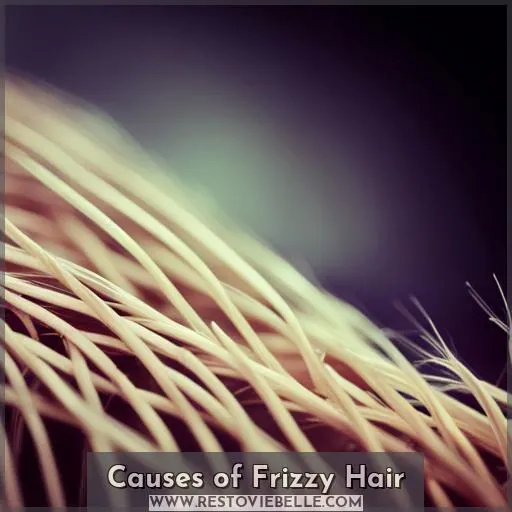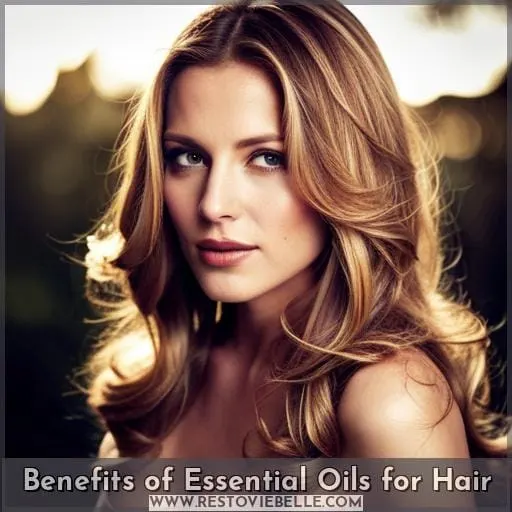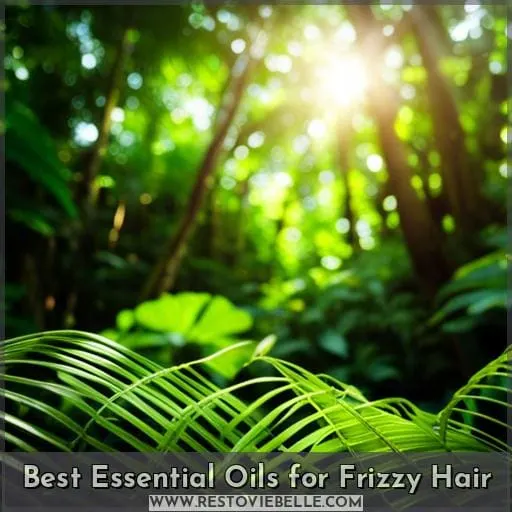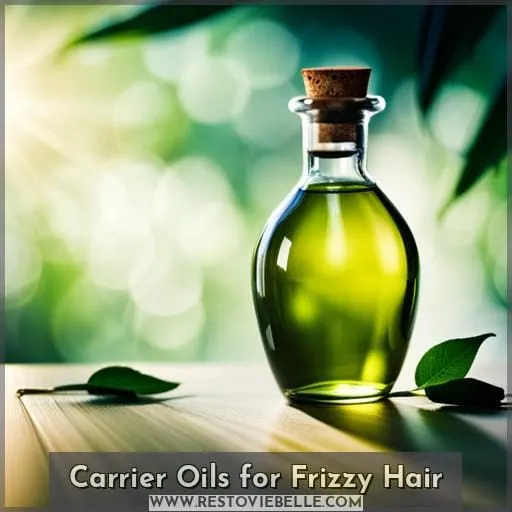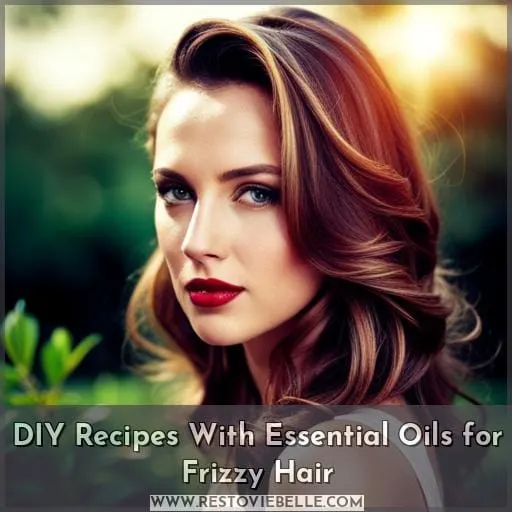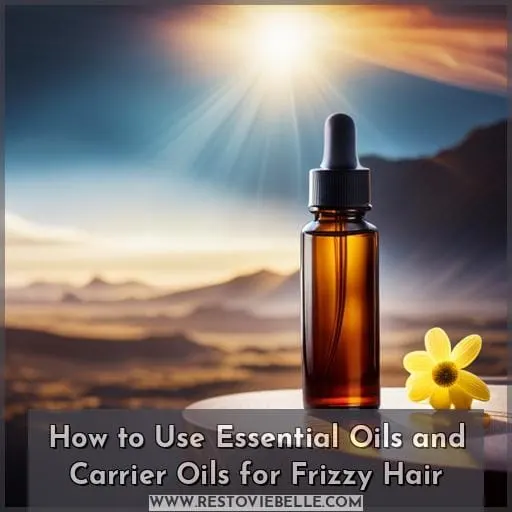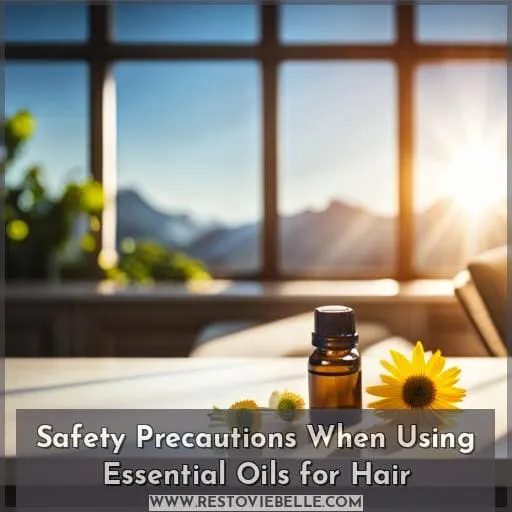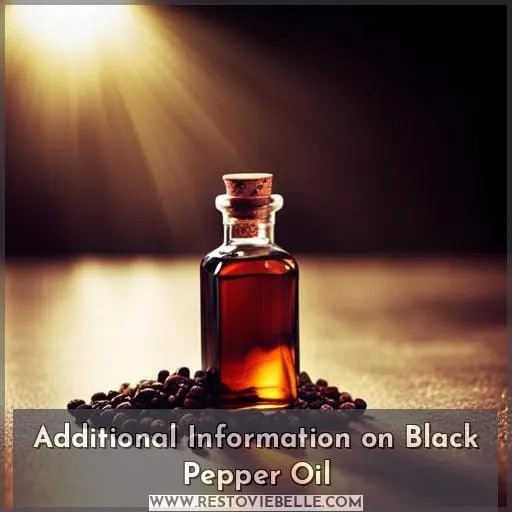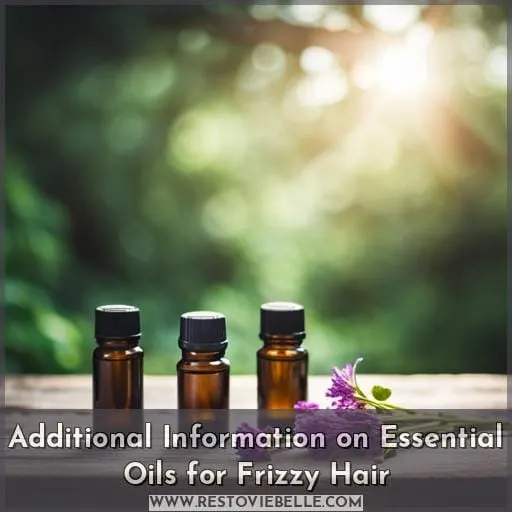This site is supported by our readers. We may earn a commission, at no cost to you, if you purchase through links.
 Frizzy hair can be a frustration, particularly when the humidity levels and temperatures rise in summer. To help tame unruly manes, essential oils are an excellent solution. As they are naturally derived from plants and herbs, these powerful extracts offer long-lasting results with minimal side effects – making them perfect for those seeking liberation from frizzy locks! From rosemary to peppermint to lavender oil – discover the best essential oils for fighting frizz and restoring your hair’s moisture balance with our guide on using essential oils for your own DIY recipes.
Frizzy hair can be a frustration, particularly when the humidity levels and temperatures rise in summer. To help tame unruly manes, essential oils are an excellent solution. As they are naturally derived from plants and herbs, these powerful extracts offer long-lasting results with minimal side effects – making them perfect for those seeking liberation from frizzy locks! From rosemary to peppermint to lavender oil – discover the best essential oils for fighting frizz and restoring your hair’s moisture balance with our guide on using essential oils for your own DIY recipes.
Table Of Contents
- Key Takeaways
- Causes of Frizzy Hair
- Benefits of Essential Oils for Hair
- Best Essential Oils for Frizzy Hair
- Carrier Oils for Frizzy Hair
- DIY Recipes With Essential Oils for Frizzy Hair
- How to Use Essential Oils and Carrier Oils for Frizzy Hair
- Safety Precautions When Using Essential Oils for Hair
- Who Should Avoid Using Essential Oils for Hair?
- Additional Information on Black Pepper Oil
- Additional Information on Essential Oils for Frizzy Hair
- Conclusion
Key Takeaways
- Causes of frizzy hair include dehydration, diet, harsh products, and grooming tools.
- Essential oils such as rosemary, peppermint, lavender, tea tree, and cedarwood can stimulate hair growth and nourish the scalp.
- Carrier oils like argan, fractionated coconut, olive, castor, and jojoba can combat frizz and provide hydration.
- When using essential oils, it is important to dilute them, conduct patch tests, and take necessary precautions for safety.
Causes of Frizzy Hair
You may be experiencing frizz due to dehydration, an improper diet, grooming tools, or products containing harsh chemicals that damage your hair.
Frizzy hair can be prevented with proper care and hydration techniques. Drinking plenty of water and consuming a balanced diet will help keep your scalp healthy and nourished.
Using sulfate-free shampoos and conditioners ensures that the natural oils in your scalp aren’t stripped off when washing it regularly.
Incorporating essential oils into your haircare routine is also beneficial for preventing frizziness.
Benefits of Essential Oils for Hair
You may have heard of the many benefits essential oils can offer for your hair. These natural, plant-based extracts are known to stimulate hair growth, nourish scalp health, and provide moisturizing properties that help control frizz.
Hair growth stimulation
Grow your tresses with the power of potent essential oils and tame even the wildest frizz. Hair growth techniques using natural remedies, like essential oil blends, can help nourish hair follicles and stimulate new growth.
Scalp massage benefits include improved circulation for healthy strands and enhanced absorption to get the most out of each blend used in hair care routines.
For safe use, dilute pure essential oils with carrier oil, patch test before application, and avoid during pregnancy or lactation. Store them properly away from heat or sunlight, never ingest, and keep them away from sensitive areas and eyes.
Use aromatherapy vapor therapy or massage into the scalp for the best results on frizzy hair types.
Rosemary, peppermint, lavender, tea tree, cedarwood, sandalwood, chamomile, almond, eucalyptus, argan, coconut, olive, jojoba, castor, vitamin E are all excellent choices!
Moisturizing properties
Your locks will benefit from the moisturizing properties of essential oils like rosemary, peppermint, lavender, and tea tree. Use them in a deep conditioning hair mask to reduce frizz with overnight treatments or as part of your regular routine with scalp massage and aromatherapy benefits.
Jojoba oil is great for nourishing dry strands, while almond oil helps regulate texture – both ideal additions to any hair care regimen.
So give your tresses some love by using these natural ingredients to keep them soft and smooth all year round!
Frizz control techniques
To ensure you don’t end up with a wild mane, try combining some of nature’s finest ingredients to tame your tresses. Frizz-fighting techniques can include natural remedies like essential oils blended with carrier oils for moisture and nourishment.
Hair care routines should also incorporate anti-frizz products that add humidity control into the mix. A few drops of lavender oil or chamomile in your shampoo will help manage alopecia, while smoothly applying rosemary oil on the ends prevents split ends from appearing, even when exposed to high temperatures and UV rays of sunlight.
With these hair products, frizzy hair is manageable without resorting to harsh chemicals!
Best Essential Oils for Frizzy Hair
When it comes to managing frizzy hair, essential oils can be incredibly beneficial. Rosemary Essential Oil helps promote hair growth and nourish the scalp, while Peppermint Essential Oil works to regulate texture and reduce split ends.
Lavender Essential Oil is known for its calming properties that soothe the scalp, while Tea Tree and Cedarwood are both effective in helping moisturize your strands.
Rosemary Essential Oil
Rosemary oil can help you gain control of your frizz, while nourishing and moisturizing your scalp. Its benefits include stimulating hair growth and promoting a healthy scalp environment with its anti-inflammatory properties.
It also balances sebum production to regulate texture and aids in the repair of damage from chemicals or styling tools. Additionally, it may reduce dandruff by fighting bacteria and fungus on the skin’s surface.
Use rosemary essential oil for an invigorating scalp massage or mix it into shampoos for extra hydration. Either way, it will leave you with softer strands! For more intense results, try out some DIY recipes like adding it to coconut oil as a pre-wash treatment.
Peppermint Essential Oil
Peppermint oil offers a cooling and refreshing sensation that can help tame frizz for silky, smooth hair. It is an essential oil blend with anti-inflammatory properties that stimulate the scalp while increasing circulation to promote healthier follicles.
A scalp massage using peppermint oil benefits from its soothing aroma, which helps reduce stress and tension in the body. It also improves hydration levels in the scalp. For added nourishment, try adding it to your deep conditioner or creating a hydrating hair mask with other oils like coconut or olive for extra moisture control.
To ensure safety when using peppermint essential oil on frizzy hair, always do a patch test before use. Also, dilute it properly by mixing it with carrier oils such as jojoba or avocado before applying it directly onto the skin or scalp area.
Finally, aromatherapy incorporating this refreshing scent has been known to improve mental clarity during stressful times – perfect for calming down unruly locks!
Lavender Essential Oil
Embrace the calming effects of lavender essential oil, like a warm hug on a cold day for your tresses. Lavender oil has long been used to promote strong and healthy hair growth while relieving scalp inflammation.
Benefits include moisturizing, nourishing follicles, regulating texture, and overall shine.
Aromatherapy with this powerful herb can also bring about relaxation – perfect before bedtime or after an intense day at the office! Recipes combining it with carrier oils like coconut or jojoba can help hydrate those dry locks while controlling frizziness as well.
However, caution should be taken when using lavender essential oil due to its photosensitivity properties; make sure you do a patch test first prior to use if you have any skin pigmentation issues or allergies that could cause irritation upon contact!
Tea Tree Essential Oil
Tea Tree oil is a beneficial addition to your hair care routine, offering nourishment and relief from frizziness. Its antiseptic properties can help soothe the scalp while its anti-inflammatory effects provide an ideal environment for healthy hair growth.
Tea Tree recipes abound online; simply mix it with other carrier oils like coconut or olive to create a custom blend perfect for your own needs! Additionally, use tea tree in shampoos, conditioners, and styling products to bring balance back to unruly locks without damaging them further.
Always be sure to read labels carefully when using any product containing tea tree essential oil—safety precautions are important since this potent ingredient may cause irritation if used improperly on sensitive skin types!
Cedarwood Essential Oil
Cedarwood oil can help nourish your hair and tame those unruly strands for soft, healthy locks. Its anti-inflammatory properties make it an ideal addition to hair care products. Massage a few drops of the oil into your scalp regularly to promote circulation and stimulate new growth.
Or add cedarwood essential oil to DIY recipes or store-bought blends to reap its benefits when using aromatherapy for frizzy hair management. Remember to always dilute essential oils with carrier oils before use. Take precautions such as patch testing prior to application, avoiding sensitive areas, and not ingesting them.
Cedarwood is a powerful tool that can give you the results you want without compromising safety.
Carrier Oils for Frizzy Hair
If you’re looking to tame your frizz, carrier oils such as Argan, Fractionated Coconut, Olive, Castor, and Jojoba are your best bet. These natural oils nourish hair follicles and lock in moisture for a smooth finish that will last all day long.
Argan Oil
Renew your locks with the luxurious Argan oil, a natural remedy that helps tame wild strands and nourish dry hair.
- Softens and hydrates without leaving residue
- Improves texture with antioxidants
- Fights scalp irritation for improved shine
- Strengthens damaged cuticles from over styling.
Apply Argan oil directly or mix it in with sweet almond oil for optimal results. And don’t forget to compare its effects against coconut, olive, castor, or jojoba oils!
With regular use of this miracle elixir, you’ll soon be flaunting healthier tresses free of frizziness and split ends.
Fractionated Coconut Oil
Fractionated Coconut Oil is a carrier oil that’s great for taming frizzy strands and restoring softness to hair. It has many benefits, such as moisturizing and nourishing the scalp, as well as regulating hair texture.
Fractionated coconut oil can be used for massage, vapor therapy, or added to shampoo/conditioner.
Its properties make it different from regular coconut oil. It is in liquid form, which resists rancidity even in warm temperatures, while retaining all of its beneficial nutrients, such as vitamins E & K and lauric acid content.
With fractionated coconut oil, you can not only help control frizz but also improve the shine and manageability of your locks with this super-oil!
Olive Oil
For an intensely moisturizing and nourishing treat, olive oil is the perfect choice for managing frizzy hair. Rich in vitamins and antioxidants, it can help promote scalp health while hydrating dry strands.
Olive oil hair masks stimulate growth and reduce breakage with regular use, leaving your locks smooth and shiny. Compared to other carriers like coconut or jojoba oils, it has a longer shelf life, which makes DIY recipes more cost-effective than store-bought products for natural remedies.
Castor Oil
Try using castor oil for smoother, more manageable hair – it’s a great way to tame the frizz! Not only does castor oil promote healthy hair growth, but it can also help nourish and moisturize your scalp.
Here are three ways you can incorporate this natural remedy into your routine:
- Make an overnight treatment by mixing equal parts of castor oil with another carrier oil like olive or jojoba. Massage into the scalp and leave it in overnight before shampooing out in the morning.
- For extra hydration on dry ends, massage a few drops directly onto damp strands after showering – perfect for those prone to split-ends or flyaways!
- Castor oil also makes an excellent pre-shampoo mask. Apply generously throughout wet hair twenty minutes prior to washing off with a mild shampoo and conditioner combo as usual.
Jojoba Oil
Jojoba oil is a great choice for taming your mane, as it’s packed with natural emollients and helps to keep moisture locked in. It’s unique composition of fatty acids, vitamin E, and powerful antioxidants like myristic acid and oleic acid offer numerous benefits for frizzy hair.
Jojoba oil penetrates deep into the scalp, allowing hydration to reach where it’s needed most. Plus, its anti-inflammatory properties help soothe any irritation caused by dryness or damage from styling products.
Furthermore, Jojoba oil can be used on both wet or dry hair as a leave-in treatment that nourishes the follicles while providing shine without leaving behind residue or weighing down strands like other oils often do! When combined with essential oils such as lavender or cedarwood, you’ll have an unbeatable combination of moisturizing power that will restore life back into dull locks.
DIY Recipes With Essential Oils for Frizzy Hair
Create your own DIY recipes with nourishing essential oils to help tame and revive frizzy hair. Try a combination of rosehip seed oil, lavender oil, and jojoba for an ultra-hydrating hair mask that will leave locks looking glossy and smooth.
Mix peppermint oil with fractionated coconut oil to create a frizz-fighting serum that can be applied directly to the scalp or ends for maximum moisture retention.
Make your own homemade conditioner by combining olive or almond carrier oils with chamomile essential oils.
To make an all-natural hairspray, combine aloe vera gel with cedarwood or tea tree essences in a spray bottle.
Experimenting is encouraged when creating DIY recipes. Add vitamin E as well as other beneficial plant extracts such as sandalwood into the mixes to reap even more impressive benefits for luscious locks!
Keep these tips in mind: always dilute essential oils before use, patch test first, avoid sensitive areas like eyes, ears, and mouths, store properly away from heat and sunlight, etc.
Never ingest any product containing undiluted essences. With these simple steps, you’ll soon have salon-worthy results right at home using only pure ingredients!
How to Use Essential Oils and Carrier Oils for Frizzy Hair
You can use carrier oils like argan, coconut, and olive to help tame your frizzy hair. An amazing fact is that essential oils are actually effective in managing frizz for up to seven weeks.
- Mix essential oil with a carrier oil before applying it onto the scalp or strands as needed.
- Massage the blend into the scalp gently, allowing it time (30 minutes – overnight) to work its magic before washing off with mild shampoo afterwards.
- Essential Oil blends such as lavender & cedarwood or peppermint & tea tree offer maximum benefits when used together, providing excellent control over frizziness while nourishing follicles at the same time.
To ensure safety, always dilute essential oils, do a patch test prior to using, avoid during pregnancy/lactation, and store properly away from direct sunlight or heat sources once opened.
Safety Precautions When Using Essential Oils for Hair
Before using essential oils for your hair, it’s important to take safety precautions to ensure you don’t experience any unwanted side effects.
Patch testing is a must before applying any essential oil blend directly onto the scalp or skin.
Pregnant and lactating women should avoid the use of these oils as some can cause adverse reactions in certain individuals.
Be aware of photosensitivity when using these products; citrus-based formulas may increase sun damage if exposed within 12 hours after application, so be sure to check ingredient labels carefully!
Consider storage tips like keeping bottles away from direct sunlight and out of reach from children or pets who might accidentally ingest them.
Dilution guidelines are also important – never apply undiluted essential oils topically as they can lead to irritation due to excessive concentration levels!
Finally, those on chronic medications, with bleeding disorders, or undergoing recent/future surgeries should always consult their physicians before incorporating essential oil into their routine for the best results and maximum safety benefits.
Who Should Avoid Using Essential Oils for Hair?
It’s important to know who should avoid using essential oils for hair care, so you can stay safe and get the best results. Pregnant and lactating women are advised against using essential oils due to the potential risks they pose on unborn babies or young infants.
Those taking chronic medications should also refrain from regular use as it may interfere with drug efficacy. This includes those undergoing surgery in recent times or expecting a transplant soon.
People with skin conditions such as eczema, lysine deficiency, etc., must be careful when applying these products topically.
Finally, individuals suffering from high/low blood pressure have been cautioned not to use any form of aromatherapy without first consulting their doctor, especially if they’re planning long-term usage.
This is because some ingredients present in certain mixtures might worsen their condition over time despite initial positive effects due to virgin coconut oil (VCO), chamomile essential oil (EO) blended with golden jojoba oil (JBO).
Additional Information on Black Pepper Oil
Discover the therapeutic benefits of Black Pepper Oil for skincare and wellness, crafted from the finest black pepper seeds. This oil provides muscle relief, skin rejuvenation, and relaxation. Aromatherapy uses Black Pepper Oil to treat tendonitis, arthritis, or rheumatism.
It also improves circulation and revitalizes the skin. Purity checks guarantee that the oil is free from adulterations. Its potent properties extend beyond just managing frizzy hair. Black Pepper Oil is versatile and can be used for vapor therapy or massage to effectively remedy colds and chills.
Before using, make sure your brand has a trustworthy reputation. Then, apply the oil blended with carrier oils like jojoba or almond onto the scalp for 30 minutes or overnight. The result? Rejuvenated scalp tissue and improved texture and shine! Enjoy the healing effects of Black Pepper Oil without worrying about photosensitivity issues by following safety precautions such as dilution and patch testing beforehand.
Additional Information on Essential Oils for Frizzy Hair
Transform your tresses with the power of potent essential oils for a frizz-free mane. Essential oils are known to be beneficial in promoting hair growth, moisturizing the scalp, and nourishing follicles while regulating hormones that can cause excessive hair fall.
Lavender, cedarwood, tea tree, and rosemary help tame frizzy locks by hydrating them and protecting against damage from heat styling tools or environmental factors. To reap their benefits, mix one drop of essential oil into 10 drops of carrier oil such as argan, fractionated coconut, or jojoba.
Massage it onto your scalp and leave it on for 30 minutes to overnight before washing off with a mild shampoo.
Safety precautions should always be taken when using these powerful compounds. Dilute properly prior to use and do a patch test first if necessary. Avoid using essential oils during pregnancy or lactation, as well as on sensitive areas like eyes or ears.
Also, check for photosensitivity risks. People taking chronic medications or undergoing surgery may want to consult with their doctor before using essential oils.
Nagarmotha Oil is excellent at providing relief from muscle aches. Eucalyptus Oil helps soothe sore muscles. Cedarwood Oil works wonders on skin rejuvenation. Rosemary is an effective remedy against colds and chills.
With proper application guidelines followed carefully, you’ll soon see results without any adverse effects!
Conclusion
Did you know frizziness affects up to 90% of women? With the right essential oils, frizzy hair can be made manageable and nourished. Rosemary, peppermint, lavender, tea tree, and cedarwood oils are some of the best essential oils for frizzy hair.
Combined with carrier oils like argan, fractionated coconut, olive, castor, jojoba, and almond, essential oils can make a powerful blend for frizzy hair. However, it’s important to be mindful of safety precautions when using essential oils.
Always dilute essential oils, do a patch test, and avoid using them during pregnancy or lactation.
With the right essential oils, frizzy hair can become soft, manageable, and nourished.
